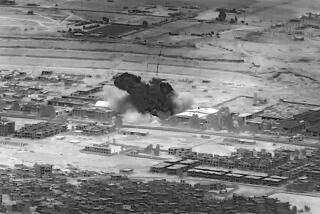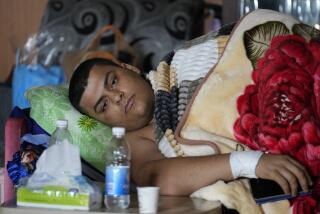28 Die in Wave of Insurgent Attacks in Iraq
- Share via
BAGHDAD — Insurgents launched a string of deadly attacks throughout Iraq’s volatile Sunni Triangle region Tuesday, targeting the nation’s fledgling security forces with ambushes and car bombs that killed at least 28 people and wounded 40 in four cities.
Tikrit, the hometown of ousted President Saddam Hussein and a city that has been relatively quiet in recent months, saw the most violence. In the deadliest single attack, insurgents swarmed a police station, executed 12 officers and blew up the building.
One other Iraqi security officer was killed and three others wounded in strikes against police checkpoints in and around Tikrit, military officials said.
U.S. officials said it appeared likely that the Tikrit attacks, which came during the same three-hour period as similar strikes in Balad, Samarra and Baqubah, were part of a coordinated campaign to kill and intimidate Iraqi security personnel as they prepare for next month’s national assembly election.
“We haven’t seen anything like that in Tikrit in a while,” said Maj. Neal O’Brien, spokesman for the 1st Infantry Division, which is responsible for a large area north of Baghdad.
In Baqubah, an ambush left five Iraqi national guardsmen and a civilian dead. The attack began as a national guard patrol approached a notoriously dangerous downtown traffic circle and struck a roadside bomb. The blast injured four.
After discovering a second bomb nearby, Iraqi officers cordoned off the area and began to defuse the device. As they worked, a suicide car bomber sped toward them and detonated his explosives.
“They want you out there, focused on something else,” Lt. Col. Keitron Todd, executive officer for the 3rd Brigade Combat Team, said of the two-phase attack. “We’ve seen it before.”
Also in Baqubah, gunmen assassinated Capt. Naem Muhanad Abdullah, a police commander.
Farther north, in Samarra, insurgents attacked an American patrol with small arms and rocket-propelled grenades, O’Brien said. U.S. troops killed three of the attackers.
Later, a suicide bomber attempted to ram a passing U.S. Bradley fighting vehicle, but became ensnared in barbed wire. The explosives detonated prematurely, about 100 yards from the convoy, U.S. officials and witnesses said. Ten Iraqis were wounded, including women and children.
Military officials, who have been struggling to restore the peace in Samarra, imposed a curfew, residents said, and have banned cars from entering the city until at least today.
In Balad, five Iraqi police officers were killed in four attacks on traffic checkpoints around the city. U.S. and Iraqi officials predict that such attacks will increase as the country prepares for the Jan. 30 election.
Officials announced that on Tuesday alone, they had discovered and destroyed six explosives-rigged cars, including five that were stopped at checkpoints south of the capital.
Insurgent leader Abu Musab Zarqawi claimed responsibility Tuesday for the assassination attempt Monday against the leader of Iraq’s largest Shiite Muslim party. Abdelaziz Hakim, a candidate for the transitional national assembly, was not injured in the attack, but 15 people were killed.
In Baghdad, a U.S. military leader Tuesday praised Iraqi’s security forces as fast-improving. “The glass is half-full,” said Brig. Gen. Jeffery Hammond of the 1st Cavalry Division. “This isn’t the [Iraqi Civil Defense Corps] of the past. These guys want to be part of the solution.” Soldiers in the civil defense corps, which was reorganized into the national guard, were widely criticized for running away from combat.
Although no U.S. troops were killed Tuesday, one Marine died in what the military called a “non-hostile incident” while conducting “security and stabilization operations” in Al Anbar province.
Hammond said U.S. and Iraqi troops were preparing to secure polling stations around the country to protect voters.
In the wake of last week’s suicide bombing at a U.S. base near Mosul, military leaders also are taking steps to tighten security at U.S. installations, Hammond said at a briefing with reporters in Baghdad. “That caused everyone to step back,” he said.
The insurgent group that claimed responsibility for the attack on the mess tent said the bomber sneaked in through a gap in the fence. The bomber may have been disguised as an Iraqi solder.
Hammond has ordered that all non-U.S. military personnel, including Iraqi soldiers and civilian contractors, be searched before entering base facilities such as dining hallsand gyms. Armed guards are now posted outside the facilities, and troops will eat in shifts to reduce the number congregated at one time.
At a base in Taji, north of Baghdad, Hammond revoked all 2,000 identification badges that had been issued to non-U.S.-military personnel. The base shut down for two days while new background checks were conducted on every individual.
In other developments Tuesday, militants released a videotape saying they had executed eight Iraqis and released two who were employed by the Sandi Group, an American security firm, and had been held hostage since Dec. 13, Associated Press reported.
*
Times staff writer Louise Roug in Baqubah contributed to this report.
More to Read
Sign up for Essential California
The most important California stories and recommendations in your inbox every morning.
You may occasionally receive promotional content from the Los Angeles Times.










